Navigation Lighting for Kayaks!
If you are planning to take your yak out on the water after sunset there are a number of important safety requirements that you need to consider but the primary one is being seen by other boaters! You need to provide some navigational lighting that lets other boaters know your location and course. The exact requirements may vary in your state but in waters regulated by the USCG, a vessel under oars must at a minimum have on board a hand held light. Personally, I would recommend a stern light that is pole mounted in the back of the kayak.
As far as using red/green bow lights. That question is a little more involved for the kayaker. First of all, once in the yak you probably can’t reach a bow light to turn it off and on as needed. Second, there can be an issue with the mount height on a kayak. The USCG states “an unbroken light over an arc of the horizon of 112.5 degrees“ for the side lights and the bow of a kayak is pretty low. Another issue with a low mounted side light is when there is a chop on the water. At a distance a very low mounted bow light may appear to flash off and on which gives confusing signals to other boaters. However, a kayaker probably should not be on the water at night in choppy conditions anyway. In my opinion, night time kayak fishing should be reserved for calm, glassy conditions. You’ll find calm conditions way more enjoyable and easier to fish.
The bow lights can be an added safety feature if installed and used correctly but are not mandatory, at least under USCG rules.
If you are looking for some navigation lights for your kayak, take a look at the “ATTWOOD Marine LED BOW & STERN LIGHT COMBO – 14180-7” This is an Amazon link with more photo’s and additional information. Amazon was actually less expensive than Walmart!
Product Review: Attwood “Portable LED Navigation Light Kit”
This vessel navigational light kit comes with both an all-around white stern light and a red/green bow light. Each light is very compact only measuring approximately 1.25″ in dia. x 3.5″L.. Both lights are operated via a rubber on/off push button.
The lights are very compact and easily mounted and removed or even transferred to another boat. The kit comes with “C” clamps that attach the light to your boat . Power to run the lights is provided via (3) AAA batteries housed internally within each light with and O-ring seal. Since the lights are LED they require very little power.
The read all-around light comes with a (3) piece mast pole for visibility but you should verify the height requirement for mounting. In the “Florida Boating Handbook” is states that the stern light must be 3.3″ above the stern lights. USCG is a bit more complicated. It states the following: RULE 21: (e) “All-round light” means a light showing an unbroken light over an arc of the horizon of 360 degrees.
Navigation Light Requirements:
The following are the USCG requirements for navigational lighting for a vessel under oars.
RULE 25: SAILING VESSELS UNDERWAY AND VESSELS UNDER OARS
(a) A sailing vessel underway shall exhibit:
- sidelights;
- a sternlight.
(b) In a sailing vessel of less than 20 meters in length the lights prescribed in paragraph (a) of this Rule may be combined in one lantern carried at or near the top of the mast where it can best be seen.
(c) A sailing vessel underway may, in addition to the lights prescribed in paragraph (a) of this Rule, exhibit at or near the top of the mast, where they can best be seen, two all-round lights in a vertical line, the upper being red and the lower Green, but these lights shall not be exhibited in conjunction with the combined lantern permitted by paragraph (b) of this Rule.
(d)
- A sailing vessel of less than 7 meters in length shall, if practicable, exhibit the lights prescribed in paragraph (a) or (b) of this Rule, but if she does not, she shall have ready at hand an electric torch or lighted lantern showing a white light which shall be exhibited in sufficient time to prevent collision.
- A vessel under oars may exhibit the lights prescribed in this rule for sailing vessels, but if she does not, she shall have ready at hand an electric torch or lighted lantern showing a white light which shall be exhibited in sufficient time to prevent collision.
I purchased the Attwood Kit and have used it without any issues but I am considering fabricating my own stern light that will be screwed into my pvc trunk rack. Since I video all my fishing adventures I have some video issues to consider. The light height of the kit light messes up my video and shows a glare from the stern light being to far ahead of the video camera.
As soon as I come up with my solution I will post it and link it to this one.
Stay safe out there,
Larry S.
Fishing Report – Crappie – Palm Coast, Fl. 2-2-13
Saturday, Feb. 2, ,2013
Weather: high 68 , low 37 deg, Clear, Barometer 30.08 has been steady to slight trend down
Winds: light
Water temp.: ?
Major Feed Time : 5:35 PM
Target Species: Crappie (Specks) Method: Drifting with jigs
Location: local canal, Palm Coast, Fl.
Catch: (8) Specks (kept), (2) Bass (small), lost (2) Specks
One of my fishing partners, Rick and I decided to do another Speck fishing trip today. Rick wanted to fish a new place that we had not tried yet this year. I was really impressed with this little spot! It was one of the fishiest looking places I have see in Palm Coast.
Rick did a little jigging with a mini-jig on his fly rod around some cattails and caught a couple bass but could not pull out a speck along the bank.
We primarily trolled jigs around using our backwards paddling technique so you can see your poles and floats. We fished a variety of colors and none of them seemed to out fish any other. I caught most of my fish on a yellow and white jig and a white jig with a pink head. I tried several depths but mostly fished about 4′ deep. Depending on your speed, your jigs will ride above this depth in the water column. Starting and stopping will often produce a strick.
There was not much action until late. Note that the MF (major feed) was not until 5:35 PM! We probably started fishing about 3:30PM and knocked off just before dark. The bite was slow but we had some nice quality fish. They were a step up from what we have been catching.
As with the other specks we have caught recently, these all had stomach worms. They have a tendency to also attach around the eggs in the fish so I did not keep any of them. You can scrape them off the outside of the egg sack but the thought of one of these possibly getting inside the eggs and me eating it…….no I’ll pass on the that! About half of the fish were females with eggs.
Here are a few photo’s of the fish from the trip.
See ya on the water,
Larry S.
Anchoring Your Yak – The Attwood Grapnel Anchor!
Product Review: The Attwood 5 lb. Folding Grapnel Anchor
If you do any amount of fishing from your kayak, sooner or later you’re going to run into a situation where you need and anchor to best fish a particular spot. Most kayak fishing here in Florida is done in relatively shallow water and a light weight “Stake-Out Pole” will handle the job nicely. However, I will save the stake pole discussion for a future post and we’ll concentrate on conventional anchors today.
If the water is more than about 3.5′-4′ deep you’re going to need an anchor of some kind to be able to hold your position. There are a number of situations where this would apply. You might be fan casting a broad flat or maybe soaking some baits on the bottom. If you’re fan casting, you want to methodically cover the entire area where you expect the fish might be holding. Lets say you are fishing for Flounder. You have to place a bait within a very small strike zone of a few inches for those guys. Flounder don’t chase bait like a Trout, snook, Jack, etc. You need to hold your yak in one position so you can best work this spot without re-casting to areas you have already worked. To accomplish this you can envision a pie and each cast takes a small slice out of the pie until you cover the whole area. If you are fishing baits on the bottom you need a tight line so you can see when the fish picks up that bait. For this you also need an immobilized boat.
There are a number of ways to attach the anchor from a simple cleat tie off to a fancy trolley system that can reposition the anchor from one end of the boat to the other.
Attwood also manufacturers a “anchor pulley” with lock off that works pretty nicely. I have one mounted on the back of my boat and can hang the anchor off of it, deploy when needed then lift anchor, lock off and I’m ready to move. It works great but only allows for one anchor point.
The “anchor trolley” is probably the best all around anchor mounting option. Basically, you have a continuous looped rope that runs from bow to stern. there is a fixed ring that the anchor rope feeds through and you can run fore or aft to drop your anchor anywhere you need. This is a future project that I will be adding to my yak.
The last part of the equation is the business end of the system, the anchor itself. Currently I am using the Attwood Folding Gragnel when I need anchor up. Honestly, I do not use an anchor that much, just because most of my fishing doesn’t require one. However, when you need it, you need it.
Atwood makes a s,aller 3 lb model so look at both before you decide if this is the anchor for you. I use the 5 lb just to be safe.
The folding grapnel design stays folded and locked up until you are ready to deploy. The grapnel design when deployed holds well in a variety of bottom conditions.
This anchor has a heavy hot dipped galvanizing and I use mine in the saltwater more often than not. It still looks like the day I bought it.
See ya on the water,
Larry Stephens
Fishing Report, Specks-Palm Coast 1-20-13
Weather: high 74 deg, Mostly sunny, Barometer has been trending up 30.24
Winds: 8 mph ENE
Water temp.: ?
Target Species: Crappie (Specks) Method: Drifting with jigs
Location: local lake, Palm Coast, Fl.
Catch: (6) Specks, (1) Bass, (4) Bluegill, (1) Warmouth -Kept (4) Specks, (2) bluegill
After spending most of the day making plumbing repairs at home, I loaded up about 3:30PM and headed to meet Rick at a Lake in Palm Coast that I had not fished in probably 15 years. I would guess its about 8 acres or so. It has some scattered pads covering about 1/2 of the lake as well as scattered around the banks. There are a few areas of cattails along the bank also. All in all it is a real fishy looking lake. The water looks dark due to the dark bottom but is actually pretty clear.
The bream were popping the surface, feeding out in the pads. I believe if we had some crickets we would have done pretty good on them. Rick caught a few really nice ones on his fly rod with a crappie jig which is a little hard to do as the jig is a little big to fit their small mouth.
The Speck bite was real slow, we each caught (3) though we only fished a couple hours.
I did manage to catch one small bass on a chartreuse beetle spin and (1) small warmouth.
I would like to float some shiners in this place…..I expect there are some really good bass hanging around in those pads!
We’ll be fishing this place again soon.
Here’s some pictures from the trip.
Good luck,
Larry Stephens
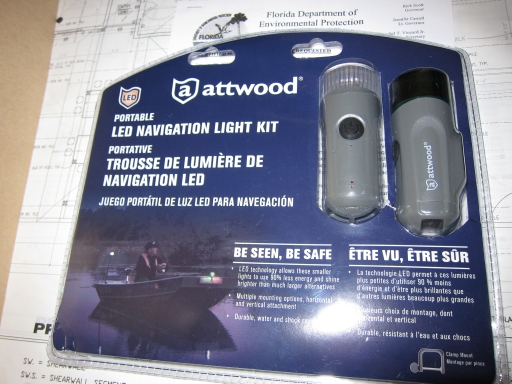
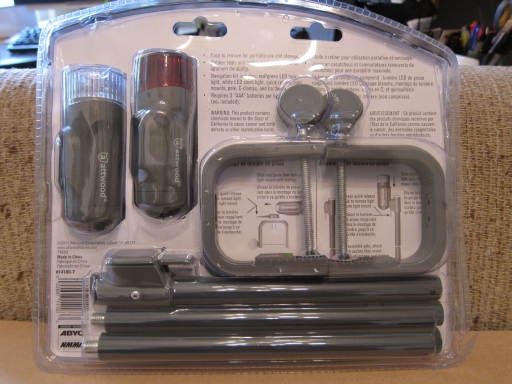
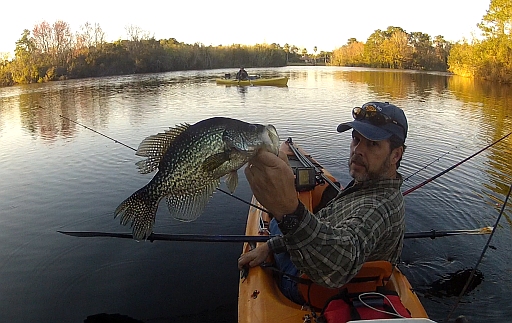
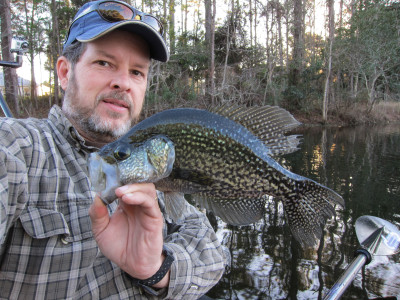
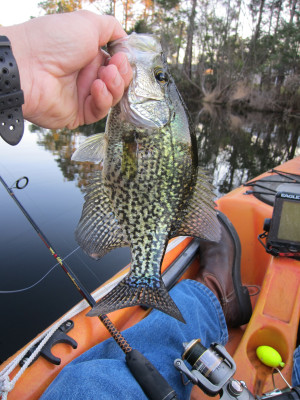
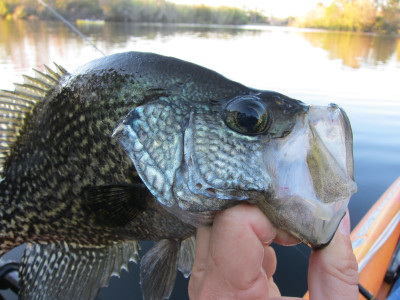
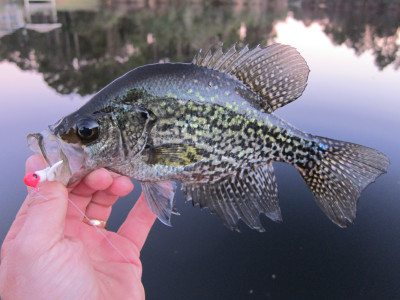
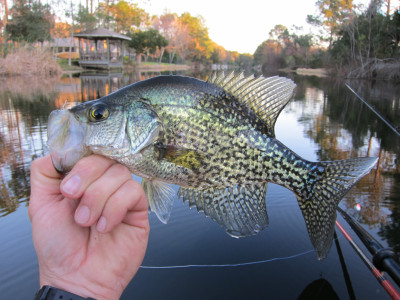
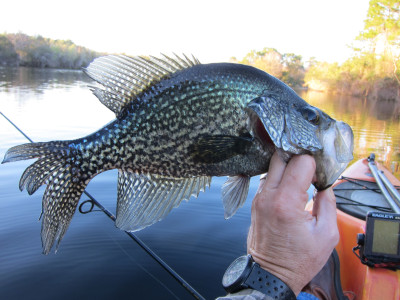
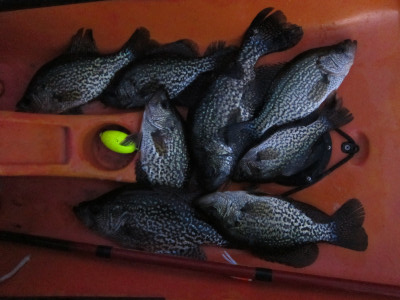
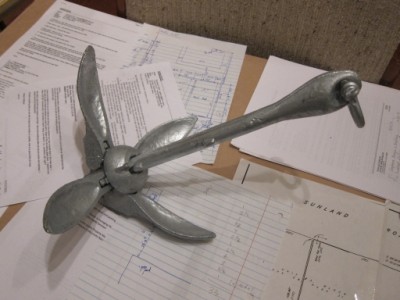

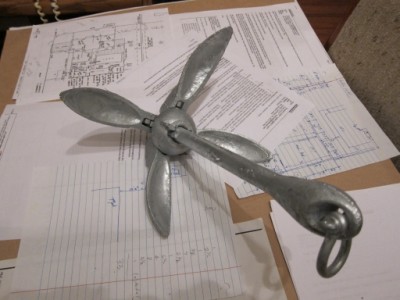
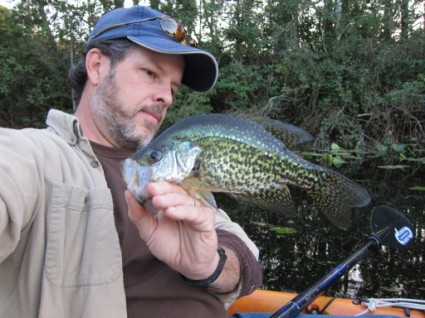
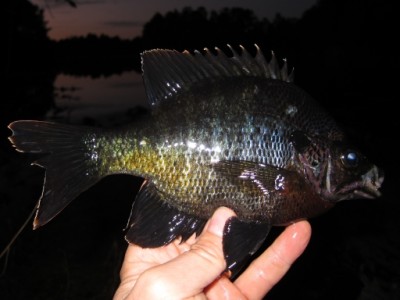
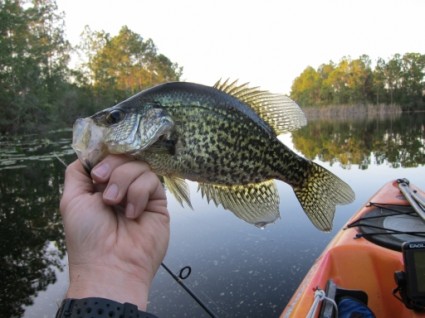
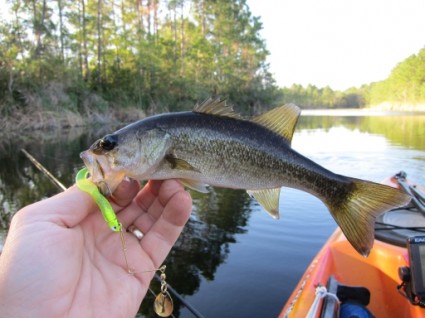
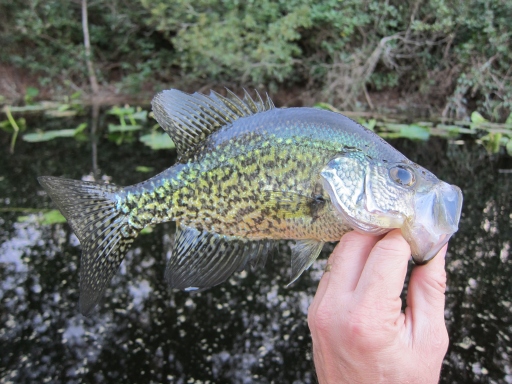
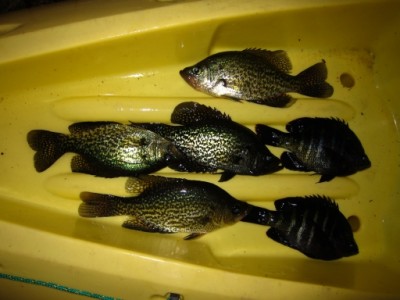
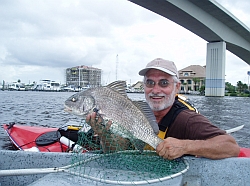
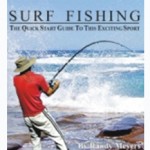
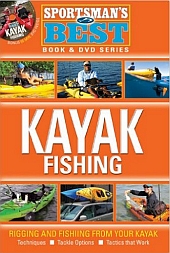
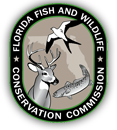
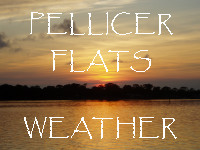
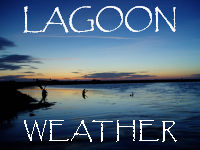
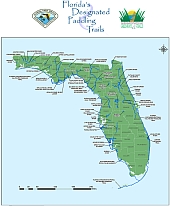
Recent Comments